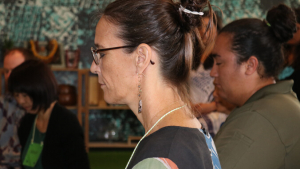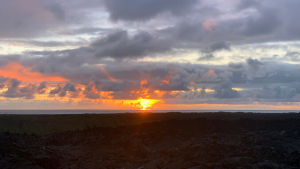
The University of Hawaiʻi at Mānoa Native Hawaiian Place of Learning Advancement Office (NHPoL AO) is leading the charge and has developed a multi-step process to achieve goals articulated in the UH Mānoa strategic plan (PDF) to advance the university as a Native Hawaiian place of learning.

“There are three goals in the Native Hawaiian Place of Learning area of the strategic plan. The one we are focusing on right now is that 100% of schools and colleges and other similar nonacademic units will create five-year strategic plans focusing on how their units can take steps toward becoming a Native Hawaiian place of learning in four specific focus areas,” said NHPoL AO Director Kaiwipunikauikawēkiu Punihei Lipe.
The four focus areas, which come from the 2012 Ke Au Hou Report (PDF) and the 2016 Ka Hoʻokō Kuleana Report (PDF) and Action Plans (PDF), include:
- Native Hawaiian Student Success
Native Hawaiian students are holistically supported from recruitment through post-graduation. Best practices are gleaned from efforts to support Native Hawaiian students and are applied to student success strategies for all students across the campus. - Staff and Faculty Development
Native Hawaiian staff and faculty are holistically supported from recruitment through promotion and leadership development in every unit across the campus. All staff and faculty at UH Mānoa are more knowledgeable and culturally rooted in Mānoa and Hawaiʻi. - Native Hawaiian Environments
UH Mānoa is a physical, cultural, spiritual and interactive environment that exemplifies the values of ʻohana and community, mālama ‘āina and kuleana, thereby perpetuating Native Hawaiian values, culture, language, traditions and customs. - Native Hawaiian Community Engagement
UH Mānoa and Native Hawaiian communities are consistently connected and engaged in order that there can be reciprocal teaching and learning for positive impact throughout Hawaiʻi.

A total of 13 units comprise the first cohort of UH Mānoa units, called Cohort Kumukahi, that will engage in an initial two-year process with the NHPoL AO. These units include:
- UH Cancer Center
- College of Arts, Languages and Letters (CALL)
- College of Engineering (CoE)
- College of Social Sciences (CSS)
- Division of Student Success (DSS)
- Hawaiʻi Institute of Marine Biology (HIMB)
- Institute for Astronomy (IfA)
- John A. Burns School of Medicine (JABSOM)
- Nancy Atmospera-Walch School of Nursing (NAWSON)
- Office of Communications
- Thompson School of Social Work & Public Health
- Sea Grant
- School of Ocean and Earth Science and Technology (SOEST)
“While also meeting the goals of the Mānoa 2025 strategic plan (PDF), this initiative keeps in line with our office’s commitment to foster a rooted, resilient and responsive community that advances UH Mānoa as a Native Hawaiian Place of Learning: a place that is responsive to Native Hawaiians and reflective of Native Hawaiʻi for all to learn, grow, connect and heal from,” said Lipe.
Cohort Kumukahi

Situated on Hawaiʻi Island, Kumukahi marks the furthest eastern point of ka pae ʻāina o Hawaiʻi (Hawaiian archipelago). The name “Kumukahi” holds poetic significance, often invoked when discussing fresh starts or beginnings. This name was chosen intentionally since this is the first cohort of its kind.

